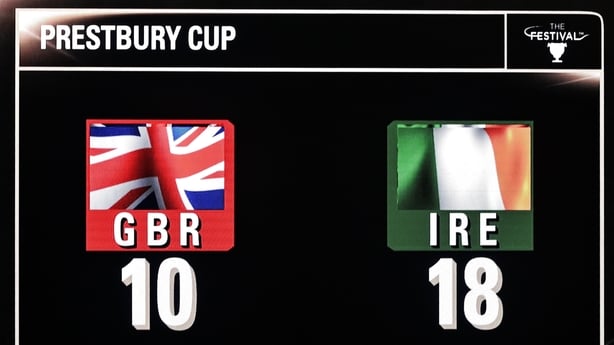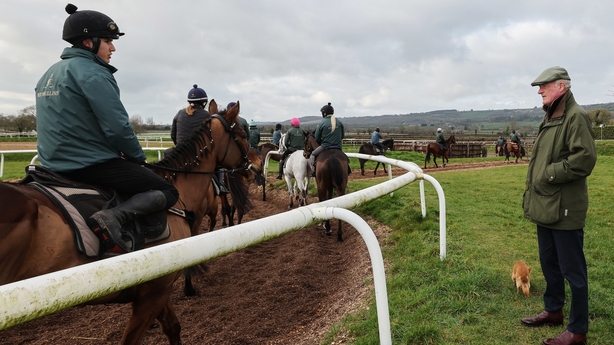The irony that the trophy awarded at Cheltenham for winning the Prestbury Cup isn't as described won't be lost on the competition's detractors. Rather than being an actual cup, it resembles an oversized, gaudy pepper mill.
Conceived by the sport's marketing boys as a conduit for increased banter, it nominally pits Ireland against Britain in bragging rights stakes, dependent on which side sends out more winners over the four days in the Cotswolds.
However, what constitutes a 'British' winner or an 'Irish' one causes some consternation.
An Irish-bred, Irish-ridden, Irish-owned winner that may have started his/her career in the Irish point-to-point sphere is classed as a British winner, even if trained by an Irishman, so long as that Irishman happens to train in Britain.
French imports that may have already shown a high level of form in their native land are also classed as either Irish or British winners by virtue of where they're currently stabled.
The Prestbury Cup’s obvious shortcomings in presenting a sport of individuals shoehorned into a team format means that it’s never been embraced by the racing media or regular fans of the sport in the way that it has by general media outlets, who seem to hold it in far higher esteem.
For all the pointless triumphalism that can emanate from the Britain v Ireland head-to-head, it does shed light on the health of the industry in the two jurisdictions.
It’s often suggested that such things are cyclical in nature, but British dominance at Cheltenham lasted all the way until 2013, when the score ended up 14-13 in favour of Irish-trained winners.
Britain once again held sway in 2015, with a 14-14 tie the outcome in 2019, but Irish-trained runners have come out on top at all of the other Festivals since 2013.
2021 proved an annus mirabilis for Irish raiders, with 23 of the 28 races won by the visitors.
Britain mounted some resistance last season after that pitiful performance, with 10 winners, but that only matched the personal haul of Willie Mullins.

Ireland’s perennial champion trainer has been crowned the leading trainer at nine of the last 12 Festivals, with Nicky Henderson (2012) and Gordon Elliott (2017, 2018) the only trainers to have dented that hegemony.
Since saddling his first winner at the meeting with Tourist Attraction in the Supreme Novices’ Hurdle in 1995, Mullins has gone on to be the all-time leading trainer with 88 winners, and will have more than 60 runners in action this year as he bids to add to that total.
The master of Closutton surpassed the 4,000-winner mark in January and is well clear in the Irish trainer's championship this season despite saddling fewer runners than Elliott, who is his nearest pursuer, with the latter sending out almost 69% more runners but lagging more than €1m behind Mullins in prize money won.
Elliott and, more recently, Henry de Bromhead have made a major contribution to the Irish-trained tally of Festival winners, but there’s no indicator that either will be usurping Mullins’ position as the leading trainer anytime soon.
The sight of Elliott lounging on a dead horse brought with it reputational damage and halted the momentum that could have led to the Meath man overtaking Mullins.
Racing is obviously a results business and the vast majority of Elliott’s owners stuck with him, but for some high-profile owners the episode proved too much and stars were lost from the yard, as well as giving potential future owners pause for thought on stabling their animals at Cullentra House.
If there’s no doubt that the power balance in National Hunt racing has shifted across the Irish Sea, establishing the 'why’ is a little more difficult.
The behemoth that the Festival has become now overshadows the calendar in a way that wasn’t the case in the past and in a manner that isn’t replicated on the Flat.
That’s not something that seems to trouble too many owners, and Irish trainers have proven more adept than their British counterparts at campaigning and readying their charges for that one big Festival target.
The mindset is reflected in the fact that the record of Irish trainers in major British races earlier in the season is undistinguished. The forays are less frequent and it’s often not the top-tier Irish-trained horses contesting these races.
A sizeable cohort of British trainers, with the most prominent among them Paul Nicholls, regularly bang the drum that there's more to life than Cheltenham, even if that’s increasingly not the case.
The 13-time British champion trainer is a big outsider to add to his five leading trainer crowns at the Festival due to adopting a more selective approach in recent years.
In the face of overwhelming Irish opposition at Cheltenham, Nicholls has adopted guerrilla tactics and shifted more of his focus to Aintree and priming his leading lights for races where Irish runners don’t turn up en masse or may not be at the top of their game after their exertions at Prestbury Park a few weeks earlier.

Success begets success, and the record of Irish trainers at Cheltenham over the last decade has attracted major British owners to yards in this country in growing numbers, compounding the talent deficit in British stables.
The level of prize money in Irish racing is also cited as a major lure for British owners, with a record €68.6m up for grabs in 2023 across both codes. However, the prize money angle could be overstated.
One of the more notable aspects of the Irish racing landscape over the last decade is the concentration of power among a select group of trainers and owners, although this is in keeping with historical norms in the sport. The Celtic Tiger period, where people who weren’t particularly wealthy owned horses, was an outlier. When these owners left the game, that led to a drop off in the number of trainers, with increasing costs exacerbating their demise.
National Hunt racing is arguably a rich man’s game to an extent not previously witnessed. Point-to-point graduates have been trading hands for record sums in acts of conspicuous consumption. Their new owners realise that they’re unlikely to recoup the price paid in prize money, and there’s no prospect of unearthing a future super-stallion. The geldings sold have no residual value when their racing careers come to an end and the mares won’t produce progeny that can command the sales prices paid for foals and yearlings of top Flat mares.
Over the four days of the Festival, we're going to see a whole host of horses carrying the silks of owners worth more than €100m that have seen their wealth skyrocket during a decade of asset price inflation.
It’s likely the quality of the trainers based on this side of the Irish Sea and not prize money considerations that have informed their decision on where to base their runners, particularly when the top Irish races are so difficult to win.
On the eve of the 28-race Festival, 19 of the favourites are Irish-trained, with eight of the market leaders hailing from the Mullins yard.
Exchange odds on the Prestbury Cup imply that Irish trainers have about a 92% chance of sending out more winners than their British rivals, with Mullins – who recently described his battalion as possibly "the best quality that we’ve ever had" – an 87% chance to again land the leading trainer accolade on Friday evening.

